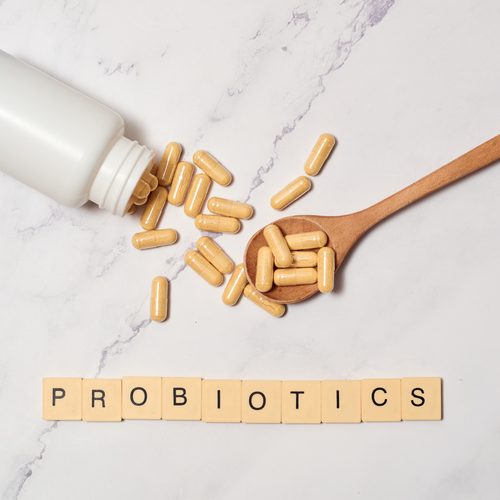What to remember:
- Constipation is characterized by a frequency of bowel movements less than 3 times per week, accompanied by hard and difficult to pass stools.
- It is common during pregnancy and affects both expectant mothers who are commonly prone to this disorder and those who did not suffer from it before their pregnancy.
- It results from several physiological and hormonal factors that intervene in the body of the pregnant woman.
- Constipation during pregnancy goes far beyond simple discomfort and can pose potential health risks to both the mother-to-be and the baby.
- There are many solutions available to relieve constipation during pregnancy.
Pregnancy is a time of great change in a woman's life, but it can also bring its share of challenges, including digestive problems such as constipation . It is characterized by a frequency of bowel movements less than 3 times per week , accompanied by hard and difficult to evacuate stools. Be aware that many pregnant women face this uncomfortable disorder, so you are not alone in this situation. This common phenomenon is linked to the multiple changes that occur in the pregnant woman's body and that can affect her digestive system.
Why is constipation common in pregnant women?
Constipation is common during pregnancy and affects both expectant mothers who commonly experience this condition and those who did not suffer from it before pregnancy. It results from several physiological and hormonal factors that occur in the pregnant woman's body. First, hormones produced during pregnancy, such as progesterone, can slow down the muscular contractions of the intestine, resulting in slower digestion and stagnant stool. In addition, the increasing size of the uterus puts pressure on the intestines, causing compression that can make it more difficult to pass stool. The ongoing hormonal and physiological changes can also affect intestinal motility, leading to increased absorption of water in the stool, making it harder and more difficult to pass. Some pregnant women may also be more sensitive to changes in their diet or physical activity level associated with this particular period of life, which can also contribute to constipation. Finally, prenatal supplements (prenatal vitamins and iron supplements), often recommended during pregnancy to support the health of both mother and baby, can sometimes contribute to constipation. Iron supplements, in particular, can harden stools and make them more difficult to pass.
What are the symptoms of constipation in pregnant women?
Although it may seem harmless, constipation during pregnancy can be a source of discomfort and embarrassment. To better take care of yourself, it's essential to recognize the symptoms of constipation during pregnancy. Here are some examples of the main symptoms to look out for when you're pregnant:
- Reduced stool frequency (less than 3 per week)
- Difficulty passing stools
- Hard, dry stools
- Feeling of incomplete bowel movements after going to the toilet
- Bloating and gas
- Pain and cramps
- Hemorrhoids
However, if you experience severe, persistent, or unusual pain, do not self-diagnose. Consult your doctor, midwife, or other qualified healthcare professional to answer your questions, provide support, and provide care if necessary.
What are the risks associated with constipation in pregnant women?
Constipation during pregnancy goes far beyond simple discomfort and can pose potential health risks to both the mother-to-be and the baby. It's important to be aware of these risks and take preventative measures to ensure your well-being and that of your child. Here is a non-exhaustive list of the main risks associated with constipation during pregnancy .
First, the discomfort and abdominal pain caused by constipation can make pregnancy less enjoyable, thus impacting quality of life. Furthermore, dehydration can be exacerbated by constipation. Pregnant women's bodies have a higher-than-average need for water, and constipation, by causing water retention in the stool and reducing the volume of fluid in the colon, aggravates this problem. Constipation can also promote the development of hemorrhoids, dilated veins around the anus and rectum, leading to unpleasant pain and itching during pregnancy. Finally, persistent constipation can lead to excessive straining during defecation, increasing the risk of perineal tears during childbirth. Constipation can also cause excessive muscle tension in this sensitive area. Overall, if symptoms persist, do not hesitate to consult a healthcare professional for appropriate advice and rapid relief.
What solutions are there to prevent and relieve constipation during pregnancy?
Constipation during pregnancy can be avoided or alleviated with effective preventative measures. Here are some solutions to maintain optimal bowel movements throughout your pregnancy:
1 - Adopt a balanced diet rich in fiber
To eat a fiber-rich diet and relieve your constipation, consider eating five fruits and vegetables a day! Dietary fiber is essential for the proper functioning of the digestive system. So, consider including 30 to 35g of fiber in your diet per day. To do this, eat enough fiber-rich foods such as fruits and vegetables (raw and cooked), whole grains, oilseeds (1 handful per day), and legumes.
2 - Ensure good hydration
Drinking enough water is essential to prevent constipation. Dehydration can cause stools to harden due to excessive absorption of water from the stool in the large intestine, making it more difficult to pass. Make sure you drink at least 1.5 to 2 liters of water per day to maintain good hydration. So, remember to take your water bottle with you everywhere!
3 - Exercise regularly
Although not always possible for all pregnant women, physical exercise is beneficial in many ways during pregnancy, including preventing constipation. Exercise stimulates bowel movements by promoting muscle contractions in the intestine. Choose activities that suit your health and comfort level, such as walking, swimming, or prenatal yoga. If necessary, don't hesitate to consult your doctor or gynecologist to ensure that the practice is suitable for your situation.
4 - Avoid stimulant laxatives
Although some laxatives can be used occasionally to relieve constipation, it is best to avoid stimulant laxatives during pregnancy. This type of laxative (medicines or plants) can cause uterine contractions or even miscarriage. Therefore, choose so-called "bulk-forming" laxatives, which increase hydration and stool volume, or so-called "osmotic" laxatives, which increase the water concentration of the stool. Generally speaking, during your pregnancy, always seek medical advice before using laxatives.
5 - Don't hesitate to talk about it with your doctor
If you experience persistent constipation despite taking preventative measures, don't hesitate to talk to your doctor. They can recommend solutions tailored to your situation and reassure you about the safety of natural remedies during pregnancy.
When should you consult a doctor if you are constipated during pregnancy?
To help you better understand constipation, here is a summary table of good practices to adopt: 
Image source: https://www.vidal.fr/maladies/estomac-intestins/constipation-adulte/que-faire.html













